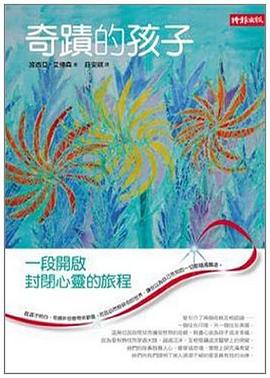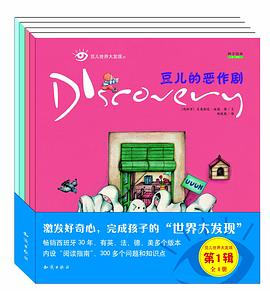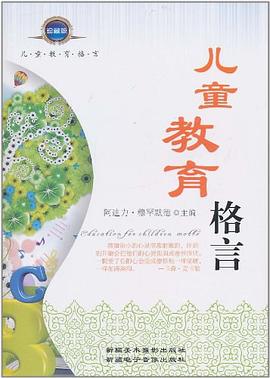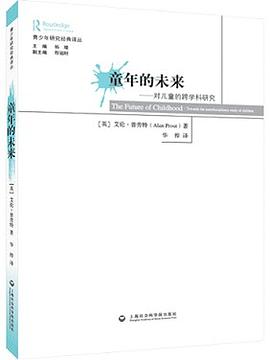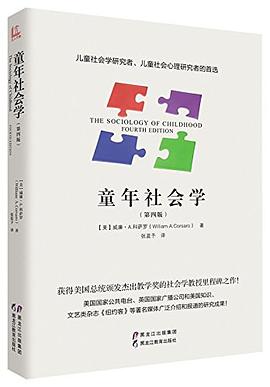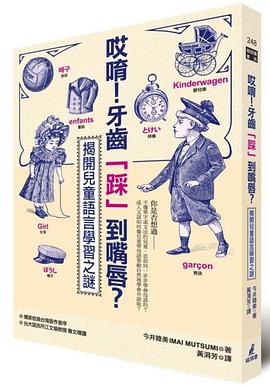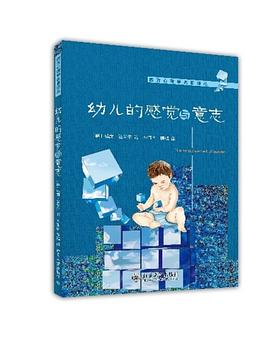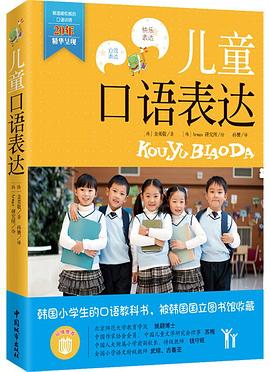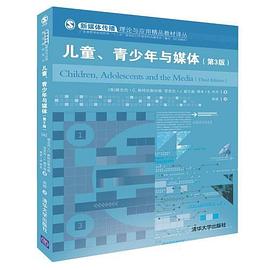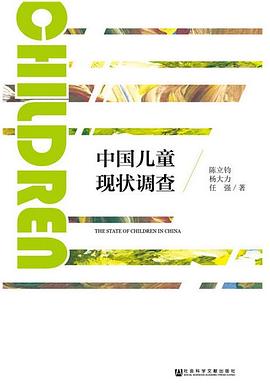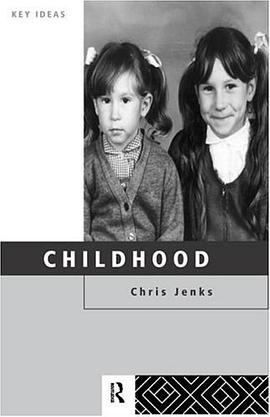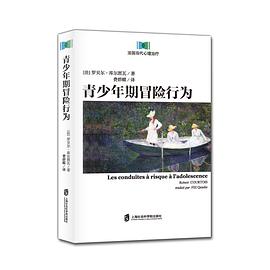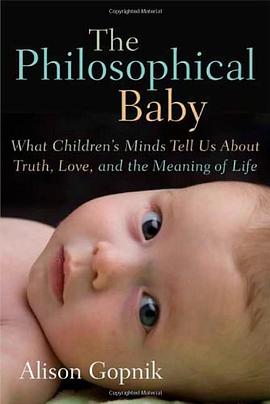

具体描述
For most of us, having a baby is the most profound, intense, and fascinating experience of our lives. Now scientists and philosophers are starting to appreciate babies, too. The last decade has witnessed a revolution in our understanding of infants and young children. Scientists used to believe that babies were irrational, and that their thinking and experience were limited. Recently, they have discovered that babies learn more, create more, care more, and experience more than we could ever have imagined. And there is good reason to believe that babies are actually smarter, more thoughtful, and even more conscious than adults. This new science holds answers to some of the deepest and oldest questions about what it means to be human. A new baby's captivated gaze at her mother's face lays the foundations for love and morality. A toddler's unstoppable explorations of his playpen hold the key to scientific discovery. A three-year-old's wild make-believe explains how we can imagine the future, write novels, and invent new technologies. Alison Gopnik - a leading psychologist and philosopher, as well as a mother - explains the groundbreaking new psychological, neuroscientific, and philosophical developments in our understanding of very young children, transforming our understanding of how babies see the world, and in turn promoting a deeper appreciation for the role of parents. Alison Gopnik, a professor of psychology at the University of California at Berkeley, is the author of "The Scientist in the Crib." For most of us, having a baby is the most profound, intense, and fascinating experience of our lives. Now scientists and philosophers are starting to appreciate babies, too. The last decade has witnessed a revolution in our understanding of infants and young children. Scientists used to believe that babies were irrational, and that their thinking and experience were limited. Recently, they have discovered that babies learn more, create more, care more, and experience more than we could ever have imagined. And there is good reason to believe that babies are actually smarter, more thoughtful, and even more conscious than adults. This new science holds answers to some of the deepest and oldest questions about what it means to be human. A new baby's captivated gaze at her mother's face lays the foundations for love and morality. A toddler's unstoppable explorations of his playpen hold the key to scientific discovery. A three-year-old's wild make-believe explains how we can imagine the future, write novels, and invent new technologies. Alison Gopnik--a leading psychologist and philosopher, as well as a mother--explains the groundbreaking new psychological, neuroscientific, and philosophical developments in our understanding of very young children, transforming our understanding of how babies see the world, and in turn promoting a deeper appreciation for the role of parents. " Gopnik's] account of what the science of recent decades has had to say about infants' minds tells a fascinating story of how we become the grown-ups that we are." --"The New York Times " " Gopnik's] account of what the science of recent decades has had to say about infants' minds tells a fascinating story of how we become the grown-ups that we are." --"The New York Times ""Gopnik is at her most persuasive when she turns her attention to the nature of infant consciousness . . . As a guide to the field of cognitive development, there can be few people better qualified than Gopnik. This eminent developmental scientist writes with wit, erudition and an admirable aversion to jargon, and her book provides an intriguing perspective on some philosophical questions."--Charles Fernyhough, "Financial Times" "I've often wondered, peering into those wide, unblinking eyes, just what it's like to be a baby. Now, thanks to Alison Gopnik's fascinating new book, "The Philosophical Baby: What Children's Minds Tell Us About Truth, Love, and the Meaning of Life," I have a pretty good idea . . . Gopnik] likens a baby's attention to a lantern, casting its light in all directions, illuminating the nooks and crannies of a strange, new world--perfect for learning a great deal in a short time . . . It's that lantern-like consciousness that allows a baby to construct a mental map of her world and how it works. Contrary to Sigmund Freud and Jean Piaget, who believed young children were limited to a 'here and now' existence, Gopnik's research proves that even 1-year-olds are capable of counterfactual thought--that 'coulda-woulda-shoulda' thinking that allows us to learn from experience, consider possibilities and change our future behavior accordingly. Humans have by far the longest childhood of any primate species. Gopnik presents compelling evidence that this period of extended helplessness is actually a key to our evolutionary success. Lantern consciousness, counterfactual thinking and imaginative play allow children to explore alternative worlds and scenarios. During this period of 'paradoxically useful uselessness, ' children learn to see the world as it could be, and to make plans to create that world--skills that will be crucial in an ever-changing adult society. Play is indeed the work of childhood, and it has been since the dawn of Homo sapiens. Gopnik is a fine writer, and her wit enlivens a subject that could easily veer into the overly abstract. Her willingness to poke gentle fun at herself, her own parenting foibles and her hometown of Berkeley make for enjoyable reading. She is also passionate about her subject. "The Philosophical Baby" isn't simply a summary of recent research on young minds. Rather, Gopnik seeks to place early childhood in the context of 2,500 years of Western philosophy. Children, she writes, help provide answers to deep, meaning-of-life questions. They 'put us in touch with important, real and universal aspects of the human condition, ' such as awe, magic, beauty and truth. Babies and children
作者简介
儿童学习和发展研究的领导者,首位从儿童意识的角度深刻剖析哲学问题的心理学家。
牛津大学心理学博士,加州大学伯克利分校心理学系教授及哲学系客座教授,曾荣获加州理工学院摩尔杰出学者奖学金。
心理理论创始人之一,第一位受邀在美国心理学会开设讲座的儿童心理学家。曾在美国科学促进会、美国心理协会、美国哲学学会及诸多儿童福利机构发表儿童心理理论的演讲。
代表作《摇篮里的科学家》(The Scientist in the Crib)以及《宝宝也是哲学家》广受好评,其中《宝宝也是哲学家》被迪士尼旗下BABBLE网站誉为“50本最佳育儿书籍”之一,她的文章和评论散见于《纽约时报》、《卫报》、《科学人》等各大媒体。
目录信息
读后感
这是一本建立在科学基础上同时又超越了科学范畴的心理学著作,它的结论建立在实验基础上同时又包含了哲学、道德和宗教的观点。可以说,每一种基础学科都是在哲学指导下的科学研究,但能够并以哲学的视点将研究结果呈现出来的并不多,因此哲学思维可以看作是本书的一个创新点。...
评分孩子如何思考? [孩子如何思考] 我们每个人都曾经是个孩子,但我们对孩子如何思考却又充满了好奇和疑问,仿佛那段人生中非常特别的时期在我们记忆中留下的东西如此之少,这种好奇和疑问也推动着一代代心理发展学家不断地对童年进行多样的探索。 就像其它两本书,高普尼克在这本...
评分初为人父,时常好奇宝宝的各种表情和动作。在我看来,小天使们整天除了吃就是睡,好不容易睡醒了还是张着嘴左右晃动咿呀咿呀呼喊,但当他们睡着后,表情却变得丰富起来,一会儿嘴角微扬,一会儿眉头紧缩,一会儿抓耳挠腮,这个问题也就应运而生:宝宝们到底在想些什么呢? 《宝...
评分这是一本建立在科学基础上同时又超越了科学范畴的心理学著作,它的结论建立在实验基础上同时又包含了哲学、道德和宗教的观点。可以说,每一种基础学科都是在哲学指导下的科学研究,但能够并以哲学的视点将研究结果呈现出来的并不多,因此哲学思维可以看作是本书的一个创新点。...
评分初为人父,时常好奇宝宝的各种表情和动作。在我看来,小天使们整天除了吃就是睡,好不容易睡醒了还是张着嘴左右晃动咿呀咿呀呼喊,但当他们睡着后,表情却变得丰富起来,一会儿嘴角微扬,一会儿眉头紧缩,一会儿抓耳挠腮,这个问题也就应运而生:宝宝们到底在想些什么呢? 《宝...
用户评价
《The Philosophical Baby》这个书名,对我而言,是一种直击心灵的召唤。它不仅仅是一个书名,更像是一种哲学命题的宣告,预示着一场关于人类心智起源的深刻探索。作为一个对认知发展和哲学史都充满好奇的读者,我一直对“人生而知之”还是“人生而不知”的争论颇感兴趣。这本书将这个宏大的哲学议题,巧妙地落脚在最纯粹的生命起点——婴儿身上。我迫切地想知道,作者是否会从婴儿的日常互动和游戏行为中,挖掘出他们对世界运行规律的早期认知,对因果关系的理解,甚至是他们对“他人意图”的洞察。这本书是否会颠覆我们对于婴儿被动学习者的认知,而是将其视为一个主动的、在生命之初就已开始构建世界模型的小小哲学家?我期待它能为我揭示人类心智最深层的奥秘。
评分The Philosophical Baby,这个书名如同一道闪电,瞬间击中了我的好奇心。一个“哲学”的婴儿?这是一种多么令人着迷的组合!它暗示着,在人类最原始、最纯粹的生命阶段,就已经存在着一种对世界深层意义的探索。我一直在思考,我们对世界的理解,究竟有多少是先天就有的,又有多少是后天习得的?这本书似乎要将这个古老的问题,带回到它的起点,聚焦于那个刚刚开始感知世界的婴儿。作者会如何通过观察婴儿的行为,来揭示他们对“存在”、“变化”、“必然性”等哲学概念的理解?我期待这本书能为我打开一扇通往婴儿内心世界的窗户,让我看到,在那些咿呀学语和纯真笑容背后,可能隐藏着对宇宙最深刻的追问。
评分当我第一次看到 The Philosophical Baby 这个书名时,我的脑海中立即涌现出无数关于人类认知起源的哲学讨论。从柏拉图的“回忆说”到洛克的“白板说”,哲学家们对人类心智的构成一直有着激烈的辩论。这本书的名字,似乎是将这场跨越千年的思辨,带回到了生命的最源头——婴儿。一个“哲学的婴儿”,这是一种何等迷人的概念!它挑战了我们对于婴儿的刻板印象,暗示着在他们尚未开口说话之前,就已经在进行着某种形式的哲学思考。我非常好奇,作者将如何通过观察和实验,来揭示婴儿对因果、对物体不变性、对“可能性”的早期理解。这本书是否会引领我重新认识人类心智的复杂性和深度,以及那些可能深埋在我们灵魂深处的、对世界本源的感知能力?
评分这本书的书名,The Philosophical Baby,光是听到就足够勾起我浓厚的兴趣。一个“哲学”的婴儿?这本身就充满了矛盾和引人深思的张力。在我们固有的认知里,婴儿是纯粹的、尚未被概念和逻辑所染指的生命体,他们用哭泣、微笑和咿呀学语来回应世界。而“哲学”这个词,则与理性、思辨、抽象思维紧密相连。将两者并置,似乎是在暗示着一种我们尚未完全理解的、婴儿内在的认知世界,一种可能比我们成人所理解的更为深刻、更为本源的对世界的感知方式。我迫不及待地想知道,作者是如何将这两个看似毫不相干的领域巧妙地结合在一起的,他又是如何从婴儿的视角出发,去探讨那些我们人类一生都在追寻的哲学命题的。是关于意识的起源?是关于经验的本质?还是关于知识的来源?这本书的书名像一把钥匙,打开了我对人类心智奥秘的无限遐想,我期待着它能为我带来一场关于“思考”本身的原初探索。
评分当我在书店里看到《The Philosophical Baby》这本书时,它的名字立刻在我心中引起了一阵涟漪。一个“哲学”的婴儿,这个概念本身就充满了一种奇妙的张力,仿佛是在说,在我们尚未被世俗规训、尚未被语言束缚之前,我们内心深处其实就已经蕴藏着一种对世界本源的探寻。我迫不及待地想要翻开这本书,去探索作者是如何将婴儿的早期认知发展与深刻的哲学思辨结合起来的。这本书是否会探讨婴儿如何理解因果关系?他们是如何形成对物体不变性的认识的?甚至,他们是否在无意识中已经对某种形式的“真理”有所把握?我期待这本书能给我带来一种全新的启示,让我重新审视人类心智的起源,以及那些被我们常常忽视的、在生命之初就已经存在的、对世界最纯粹的认知。
评分读到 The Philosophical Baby 这个书名的时候,我脑海中立刻浮现出一些关于“本能”和“先天知识”的哲学讨论。自古以来,哲学家们就一直在争论,人类的知识究竟是后天经验的产物,还是与生俱来的?这本书似乎将这个古老的问题带到了一个全新的层面,并将其聚焦于生命最早期的阶段——婴儿。一个“哲学的婴儿”,难道是在暗示着,我们作为成年人所拥有的理性思维,其实是根植于婴儿时期就已经存在的某种潜在认知结构?作者是否会运用心理学、神经科学以及哲学史上的论点,来构建他的理论?我尤其期待书中能够深入探讨婴儿是如何形成概念的,他们是如何区分“自我”与“非我”,以及他们是否在意识层面就已经对某些普遍真理有所感知。这对于理解人类的认知发展,乃至人类的本质,都将具有极其重要的意义。
评分The Philosophical Baby,这个名字本身就有一种魔力,它将最天真烂漫的生命阶段与最深邃的理性思辨相结合,在我心中激起了巨大的好奇。我们常常以为婴儿的世界是混沌的,是等待我们去填满的空白画布。但如果婴儿本身就带着某种“哲学”的基因,那么他们是如何感知和理解这个世界的呢?这本书是否会探讨婴儿如何建立对物体存在性的认知,以及他们如何理解“数量”和“空间”这些基础概念?我非常期待作者能够通过科学的研究方法,以及富有洞察力的文字,来描绘出婴儿那充满智慧的早期认知世界。这不仅仅是对儿童心理学的深入了解,更可能是一次对人类认知根基的全新审视,让我重新思考“理解”和“学习”的本质。
评分当我看到 The Philosophical Baby 这个书名时,我立刻被它所吸引。一个“哲学”的婴儿,这本身就充满了矛盾和引人深思的张力。我们通常认为婴儿是纯粹的、尚未被概念和逻辑所染指的生命体,他们用哭泣、微笑和咿呀学语来回应世界。而“哲学”这个词,则与理性、思辨、抽象思维紧密相连。将两者并置,似乎是在暗示着一种我们尚未完全理解的、婴儿内在的认知世界,一种可能比我们成人所理解的更为深刻、更为本源的对世界的感知方式。我迫不及待地想知道,作者是如何将这两个看似毫不相干的领域巧妙地结合在一起的,他又是如何从婴儿的视角出发,去探讨那些我们人类一生都在追寻的哲学命题的。是关于意识的起源?是关于经验的本质?还是关于知识的来源?这本书的书名像一把钥匙,打开了我对人类心智奥秘的无限遐想,我期待着它能为我带来一场关于“思考”本身的原初探索。
评分The Philosophical Baby,这个书名充满了诗意与哲学意味。它让我联想到那些伟大哲学家们对人类心智的深邃探究,比如洛克、休谟、康德,他们都曾试图描绘人类认知能力的起点。而这本书,则将目光投向了生命最初的那一抹亮色——婴儿。我很好奇,作者是如何从婴儿的视角,去解读那些关乎人类存在和意识的宏大命题的。是否会通过观察婴儿与世界的互动,来揭示他们对“可能性”的理解,对“意图”的洞察,甚至是他们对“公平”和“道德”的早期认知?我期待这本书能够提供一种全新的视角,让我们不再将婴儿视为一个被动的接收者,而是将其看作一个主动的、充满求知欲的探索者。这不仅会改变我们对育儿的理解,更可能重塑我们对人类心智发展轨迹的认识。
评分作为一名对认知科学和儿童发展有着浓厚兴趣的读者,The Philosophical Baby 这个书名瞬间就抓住了我的眼球。它挑战了我以往对于婴儿认知能力的固有看法。我们常常认为婴儿的世界是简单而直接的,他们主要通过感官输入来学习和成长。但是,如果婴儿真的具备某种形式的“哲学”思考能力,那意味着他们的认知过程远比我们想象的要复杂和深刻。这本书让我开始重新审视那些看似简单的婴儿行为,比如他们专注地观察一个物体,或者在面对新事物时流露出的好奇和困惑。这些行为背后,是否隐藏着对因果关系、物体恒存性,甚至是对“存在”本身的初步探索?作者是否会通过大量的研究案例和实验数据来支撑他的观点?我非常好奇这本书将如何解释婴儿是如何建立对世界的模型,以及他们是如何在没有语言的情况下进行抽象推理的。这不仅仅是对婴儿研究的深化,更可能是一次对人类普遍认知基础的颠覆性洞察。
评分婴儿大脑如r&d, 全部的任务是创新,自然不专注、低效。第五章解释了《狩猎》里失真的证词。baby对自己的意识健忘,suggestible, 是因为大量学习causal maps时刻在更新 (multiple paradigm shifts) ,过期的信息来源很快被丢弃。而前额皮层发育成熟后(可能直到二十多岁)人变专注,不再轻易改变belief, 清晰的自传体记忆防备suggestibility. truth, imagination (counterfactuals和事实同等重要), and love, 很多深刻的哲学问题解答在孩子,而哲学直到最近才开始研究他们。
评分比社会学少罗嗦一点 面试扯淡必用
评分Know thyself.
评分比社会学少罗嗦一点 面试扯淡必用
评分比社会学少罗嗦一点 面试扯淡必用
相关图书
本站所有内容均为互联网搜索引擎提供的公开搜索信息,本站不存储任何数据与内容,任何内容与数据均与本站无关,如有需要请联系相关搜索引擎包括但不限于百度,google,bing,sogou 等
© 2026 book.wenda123.org All Rights Reserved. 图书目录大全 版权所有

